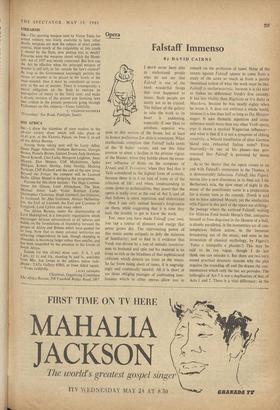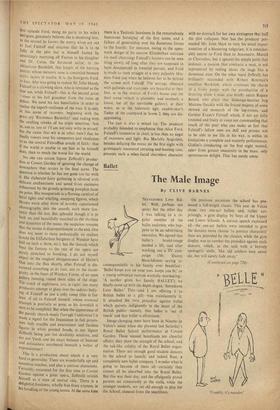Opera
Falstaff Immenso
By DAVID CAIRNS I HAVE never been able to understand people who do not , see that Falstaff is one of the most wonderful things that ever happened to music. Such people are surely not to be trusted. The failure of the gallery to take the work to its heart is saddening, especially if one likes to attribute superior wis- dom to this section of the house, but at least its honest preference for Aida is consistent. When intellectuals complain that Falstaff lacks tunes of the 'H balen' variety, and use this false premise to attest a decline in the pristine vigour of the Master; when they babble about the exces- sive influence of Boito on the composer of Ernani and II Trovatore; when they find that it 'fails considered• as the highest form of comedy, because there is in it no hint of irony or of the criticism of life'; and when, condescending to come down to technicalities, they assert that the opera is really over at the end of Act 2, and all that follows is mere repetition and elaboration —then I can only entreat heaven's forgiveness on them, while suggesting that it is time they took the trouble to get to know the work.
For, once you have made Falstaff your own, you tap a source of pleasure and energy that never grows dry. The rejuvenating power of this music seems uniquely to defy the staleness of familiarity; and to find in it evidence that Verdi was driven by a loss of melodic inventive- ness to husband and spin out his material is an irony as rich as the blindness of that sophisticated criticism which detects no irony in the music. So far from being short of tunes, it is ungrudg- ingly and continually tuneful. All it is short of are those obliging passages of contrasting tune- lessness which in other operas allow you to remark on the profusion of tunes. None of the counts against Falstaff appear to come from a study of the score so much as from a purely theoretical notion of what the work must be like. Falstaff is uncharacteristic, because it is (as near as makes no difference) Verdi's first comedy. It has less vitality than Rigoletto or Un Ballo in Maschera, because he was nearly eighty when he wrote it. It does not embrace a whole world, because it is less than half as long as Die Meister- singer. It uses thematic repetition and cross- reference much more than any other Verdi opera, ergo it shows a marked Wagnerian influence— and what is that if it is not a symptom of ebbing creativity, a belated transfusion of alien German blood into exhausted Italian veins? Even Stravinsky—in one of his phases—has pro- nounced that Falstaff is poisoned by music drama.
As to the theory that the opera comes to an end with Falstaff's immersion in the Thames, it is demonstrably fallacious. Falstaff, like Figaro, moves into a new dimension in its final act. Like Barbarina's aria, the slow onset of night in the music of the penultimate scene is a preparation for a sinster turn in the comedy. (Verdi is said not to have admired Mozart, yet the similarities with Figaro in this part of the opera are striking : the passage where the antlered Falstaff, waiting for Mistress Ford beside Herne's Oak, compares himself to Jove disguised in the likeness of a bull, is closely paralleled, in the momentary act of con- templation before action, in the immense broadening out of the music, and even in the invocation of classical mythology,, by Figaro's 'Tutu) e tranquillo e placido.') This may be said to be too vague, though I do not think one can mistake it. But there are two very sound practical dramatic reasons why the plot requires the rounding off and the drama the con- summation which only the last act provides. The imbroglio of Act 3 is not a duplication of that of Acts 1 and 2. There is a vital difference: in the first episode Ford, being no party to his wife's intrigues, genuinely believes she is deceiving him; In the second he knows the merry wives are out to fool Falstaff and assumes that he is to be fully in the plot but is himself fooled by unwittingly marrying off Fenton to his daughter and Dr. Caius, the favoured suitor, to the ubiquitous Bardolph, that knight of the burning nozzle, whose meteoric nose is concealed beneath crafty layers of muslin. It is the bourgeois Ford, In fact, who was going to reduce Sir John bloody Falstaff to a crawling slave, who is revealed as the true ass, while Falstaff—this is the second point —rises to his full grandeur from the ruins of defeat. We need his last humiliation in order to realise the superb resilience of the man. It is only In this scene of recovery, beginning with the great cry 'Riconosco Bardolfo!' and ending with the swelling rebuke of his triple assertion. 'Son 10, son io, son io' ('I am not only witty in myself, but the cause that wit is in other men') that he finally towers over his tormentors and vindicates to us the central Falstaffian article of faith: that If the world is unable to see him as he himself does, then so much the worse for the world.
No one can accuse Signor Zeffirelli's produc- tion at Covent Garden of ignoring the change of atmosphere that occurs in the final scene. The question is whether he has not gone too far with His elaborate fairy gathering is silvered with delicate enchantment and saved from excessive refinement by the grossly grinning pumpkin faces on poles. His masquerade is a flaming carnival of lurid lights and whirling, snapping figures, which throws wave after wave of lavishly caparisoned choreography into the assault, each more fan- tastic than the last. But splendid though it is to look on, and beautifully matched to the rhythms and dynamics of the music, the suspicion remains that the means is disproportionate to the end. One does not want to insist pedantically on realism (could the Eliiabethan burghers of Windsor have laid on such a show, etc.), but the threads which bind the fantasy to the rest of the opera are surely stretched to breaking. I do not myself object to the magical disappearance of Herne's Oak into the flies shortly after Falstaff is dis- covered crouching at its foot. nor to the incon- gruity, in the heart of Windsor Forest, of an open gallery running round three sides of the stage. The touch of nightmare, too, is right; too many producers attempt to gloss over the sadistic bully- ing of Falstaff as just a jolly romp (this is fair least of all to Falstaff himself, whose eventual triumph is precisely as great as his downfall is seen to be complete). But when the appearance of the parody church music ('savagli l'addomine') is made a signal for the Inquisition in full proces- sion with crucifix and executioner and faceless figures in white pointed hoods, is not Signor Zeffirelli being just too devilishly sensitive, and are not Verdi and his exact balance of humour and seriousness smothered beneath a welter of expressionism?
This is a production about which it is very hard to generalise. There are wonderfully apt and inventive touches, and also a curious clumsiness. Certainly, measured for the first time at Covent Garden against a great opera, Zeffirelli reveals himself as a man of mortal clay. There is a delightful freshness, wholly free from coyness, in his handling of the young lovers. At the same time there is a Teutonic heaviness in the remorselessly humorous horseplay of the first scene, and a failure of generalship over his gumerous forces in the fourth: for instance, owing to the open- work design of his narrow Elizabethan staircase (in itself charming) Falstaff's hunters can be seen tiling slowly off long after they are supposed to have disappeared in frenzied pursuit; and Ford is made to stare straight at a very palpable Mis- tress Ford just when he believes her to be behind the screen with Falstaff. The settings. obsessed with galleries and staircases. are beautiful at their best. as in the imerior of Ford's house and the final scene (which is plausibly and intensely a forest. for all the inevitable gallery); at their worst, as in the hideously ugly stockbroker's Tudor of the courtyard in Scene 2, they are dis- appointing.
The cast is also a mixed lot. The producer probably intended to emphasise that Alice Ford. Falstaff's tormentor in chief, is less than an angel of sweetness and light. But Mariella Angioletti, besides defacing the music on the first night with grotesquely mannered phrasing and hooting tone, presents such a whey-faced charmless character with no stomach for her own stratagems that half the plot collapses. Nor has the producer per- suaded Mr. John Shaw to vary his usual imper- sonation of a blustering vulgarian; it is consider- ably nearer to Ford than to Amonasro, Marcel or Choroebus. but it ignores the simple point that jealousy, a passion that contracts a man, is not represented by reeling about the stage like a demented steer. On the other hand Zeffirelli has brilliantly succeeded with Robert Bowman's excellent Bardolph which combines the charm of a frisky pupp% with the putrefaction of a festering plum. I must also briefly salute Regina Resnik who plays that Shakespe-hearian bag Mistress Quickly with the frayed majesty of some shrewd old monarch of the tap-rooms. and Geraint Evans's Falstaff which, if not yet fully rounded and fruity in voice nor commanding that touch of the poet who can make us feel that Falstaff's fellow men are dull and prosaic not to be able to see life in his way, is within its limitations a complete and masterly performance. Giulini's conducting on the first night wanted, apart from greater unanimity in the brass, only spontaneous delight. That has surely come.







































 Previous page
Previous page